
Ithaca, Ithaki or Ithaka is a Greek island located in the Ionian Sea, off the northeast coast of Kefalonia and to the west of continental Greece.

Pax Britannica was the period of relative peace between the great powers. During this time, the British Empire became the global hegemonic power, developed additional informal empire, and adopted the role of a "global policeman".
A protectorate, in the context of international relations, is a state that is under protection by another state for defence against aggression and other violations of law. It is a dependent territory that enjoys autonomy over most of its internal affairs, while still recognizing the suzerainty of a more powerful sovereign state without being a possession. In exchange, the protectorate usually accepts specified obligations depending on the terms of their arrangement. Usually protectorates are established de jure by a treaty. Under certain conditions—as with Egypt under British rule (1882–1914)—a state can also be labelled as a de facto protectorate or a veiled protectorate.
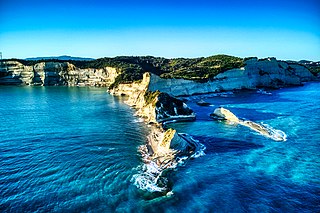
The Ionian Islands are a group of islands in the Ionian Sea, west of mainland Greece. They are traditionally called the Heptanese, but the group includes many smaller islands in addition to the seven principal ones.

Enosis is the movement of various Greek communities that live outside Greece for incorporation of the regions that they inhabit into the Greek state. The idea is related to the Megali Idea, an irredentist concept of a Greek state that dominated Greek politics following the creation of modern Greece in 1830. The Megali Idea called for the annexation of all ethnic Greek lands, parts of which had participated in the Greek War of Independence in the 1820s but were unsuccessful and so remained under foreign rule.
Lord High Commissioner is the style of high commissioners, i.e. direct representatives of the monarch, in three cases in the Kingdom of Scotland and the United Kingdom, two of which are no longer extant. Consequently, the remaining office is often known in short simply as the Lord High Commissioner.
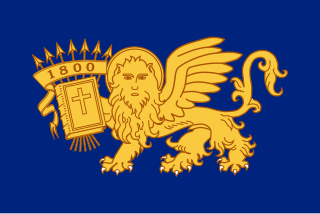
The Septinsular Republic was an oligarchic republic that existed from 1800 to 1807 under nominal Russian and Ottoman sovereignty in the Ionian Islands.

A colonial empire is a collective of territories, either contiguous with the imperial center or located overseas, settled by the population of a certain state and governed by that state.
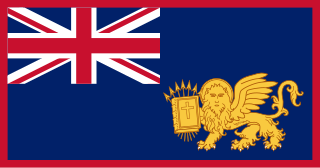
The United States of the Ionian Islands was a Greek state and amical protectorate of the United Kingdom between 1815 and 1864. The successor state of the Septinsular Republic, it covered the territory of the Ionian Islands, as well as the town of Parga on the adjacent mainland in modern Greece. It was ceded by the British to Greece as a gift to the newly enthroned King George I, apart from Parga, which had been sold to Ali Pasha of Ioannina in 1819.
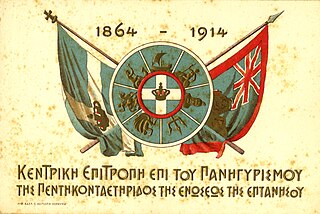
The Treaty of London in 1864 resulted in the United Kingdom ceding the United States of the Ionian Islands to Greece. Britain had held an amical protectorate over the islands since the 1815 Treaty of Paris.

The Adriatic campaign was a minor theatre of war during the Napoleonic Wars in which a succession of small British Royal Navy and Austrian Navy squadrons and independent cruisers harried the combined naval forces of the First French Empire, the Kingdom of Italy, the Illyrian Provinces and the Kingdom of Naples between 1807 and 1814 in the Adriatic Sea. Italy, Naples and Illyria were all controlled either directly or via proxy by the French Emperor Napoleon I, who had seized them at the Treaty of Pressburg in the aftermath of the War of the Third Coalition.

The Greek Senate was the upper chamber of the parliament in Greece, extant several times in the country's history.

The Ionian Islands were an overseas possession of the Republic of Venice from the mid-14th century until the late 18th century. The conquest of the islands took place gradually. The first to be acquired was Cythera and the neighboring islet of Anticythera, indirectly in 1238 and directly after 1363. In 1386 the Council of Corfu, which was the governing body of the island, voted to make Corfu a vassal of Venice. During the Venetian period the Council remained the most powerful institution on the island. A century later, Venice captured Zante in 1485, Cephalonia in 1500 and Ithaca in 1503. These three islands modelled their administration on Corfu's model and formed their own councils. The conquest was completed in 1718 with the capture of Lefkada. Each of the islands remained part of the Venetian Stato da Màr until Napoleon Bonaparte dissolved the Republic of Venice in 1797. The Ionian Islands are situated in the Ionian Sea, off the west coast of Greece. Cythera, the southernmost, is just off the southern tip of the Peloponnese and Corfu, the northernmost, is located at the entrance of the Adriatic Sea. It is believed that the Venetian period on the Ionian Islands was generally prosperous, especially compared with the coinciding Tourkokratia — Turkish rule over the remainder of present-day Greece.
British protectorates were protectorates—or client states—under protection of the British Empire's armed forces and represented by British diplomats in international arenas, such as the Great Game, in which the Emirate of Afghanistan and the Tibetan Kingdom became protected states for short periods of time. Many territories which became British protectorates already had local rulers with whom the Crown negotiated through treaty, acknowledging their status whilst simultaneously offering protection, e.g. British Paramountcy. British protectorates were therefore governed by indirect rule. In most cases, the local ruler, as well as the subjects of the indigenous ruler were not British subjects. British protected states represented a more loose form of British suzerainty, where the local rulers retained absolute control over the states' internal affairs and the British exercised control over defence and foreign affairs.

This article covers worldwide diplomacy and, more generally, the international relations of the great powers from 1814 to 1919. This era covers the period from the end of the Napoleonic Wars and the Congress of Vienna (1814–1815), to the end of the First World War and the Paris Peace Conference (1919–1920).
The Serene Grand Lodge of Greece is a Masonic Grand Lodge in Greece. The name was originally used by an organisation which existed from 1815 to 1843. After that time the Grand Lodge of Greece took its place. The present organisation under the name of the Serene Grand Lodge of Greece was refounded in 1986 by former members of the Grand Lodge. Today, they are firmly associated with Liberal Freemasonry, belonging to ISMAP and now CLIPSAS.
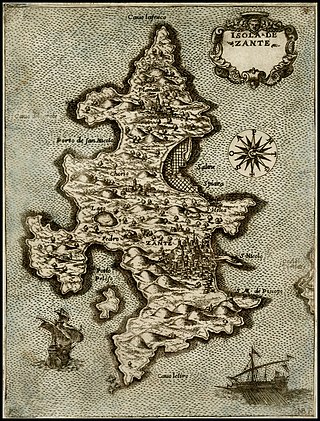
Zakynthos is a Greek island in the Ionian Sea. It is the third largest of the Ionian Islands. Today, Zakynthos is a separate regional unit of the Ionian Islands region, and its only municipality. It covers an area of 405.55 km2 (156.6 sq mi) and its coastline is roughly 123 km (76 mi) in length. The name, like all similar names ending in -nthos, is pre-Mycenaean or Pelasgian in origin. In Greek mythology the island was said to be named after Zakynthos, the son of a legendary Arcadian chief Dardanus.
The Treaty of Constantinople of 2 April [O.S. 21 March] 1800 was concluded between the Ottoman Empire and the Russian Empire, and heralded the creation of the Septinsular Republic, the first autonomous Greek state since the Fall of the Byzantine Empire.

The Second period of French rule in the Ionian Islands began in August 1807, when the Septinsular Republic, a Russian protectorate comprising the seven Ionian Islands, was occupied by the First French Empire in accordance with the Treaty of Tilsit. The French annexed the Republic but maintained most of its institutions for local governance. In 1809–10, the British occupied the southernmost islands, leaving only Corfu, Paxoi, and the mainland exclave of Parga in French hands. The British also imposed a naval blockade on the French-ruled islands, which began to suffer from famine. Finally, the British occupied Paxoi in late 1813 and Parga in March 1814. Following the Abdication of Napoleon, the French governor-general in Corfu, François-Xavier Donzelot, capitulated and the French garrison was evacuated. In 1815, the islands became a British protectorate, the United States of the Ionian Islands.














